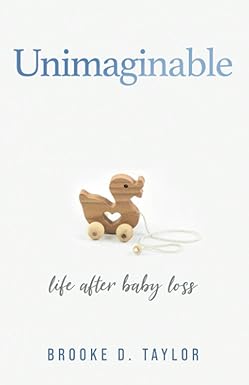
Unimaginable: Life After Baby Loss
By: Brooke Taylor Duckworth
This is an excerpt from a recently-published book by Sharing Magazine contributor Brooke D. Taylor. Unimaginable: Life After Baby Loss is now available on Amazon. It tells the story of surviving the death of her first daughter, navigating the complexities of life after pregnancy loss, and discovering that grief can somehow become a part of life without overtaking it completely.
There is no way to begin without telling you the saddest part of the story. It’s a love story, and it begins with a positive pregnancy test. It doesn’t end with a baby, though. At least not the way I thought it would. My baby died, and I suddenly found myself having to live a life I couldn’t imagine.
I had fallen in love with the idea of this baby before she ever existed. I’d been imagining our baby long before I got pregnant, as we daydreamed and saved money and waited for the “perfect time” to welcome our “perfect baby.”
I was finishing my graduate program in English literature. My husband was teaching and working on a graduate degree in education. We had been married six years. We’d stretched our shoestring budget to travel. We bought a little house, we had two little dogs, and now we were totally ready to be parents. I began preparing for motherhood the way I prepared for everything: by reading. I read books on pregnancy, natural childbirth, nutrition, breastfeeding, baby sleep, baby food, baby milestones. If I could have tested my way into motherhood, I definitely would have.
It took us a few months to get pregnant, and I fretted and worried until I saw those two pink lines. It was a Sunday morning—Mother’s Day. My period was late—finally—and when the test was positive I was absolutely elated. I was thrilled to be pregnant, of course, but I was also so glad that I had forced myself to wait and test Sunday morning. It was Mother’s Day—Mother’s Day! —what a great story to write in Eliza’s baby book.
My perfect pregnancy was off to a perfect start. Her name would eventually be Eliza Taylor Duckworth, but before she was born, we called her “Baby Duck.”
Here’s a belief that was shattered: I believed that we deserved this perfect baby. My life was privileged, sheltered. I had been lucky enough to believe that hard work and good intentions were enough to get you what you wanted out of life. I knew, of course, that bad things happened to good people, but I mostly subscribed to the idea that the world was a meritocracy. David and I were good people. We intended to be good parents. We were kind, responsible, smart, and we planned ahead. Surely, we would get the baby that we deserved. I didn’t even think that much about it, honestly. Once I got pregnant, and then got through the first trimester, it seemed obvious that we would be bringing this baby home.
I was six and a half months pregnant the day my husband got a phone call from Dennis, his best friend from college. I was standing in our tiny kitchen, leaning on the counter next to the fridge. David lowered himself onto a stool at our kitchen island. He answered his phone with a jokey greeting. Then he cleared his throat, his laughter abruptly choked into silence. I turned to look at him, and I watched as the color drained from his face.
Dennis and his wife, Lindsey, were expecting twins—a boy and a girl they named Max and Mia. They were due right around the same time that we were expecting our first child. Over the summer, we’d spent time together discussing pregnancy and planning for how much our lives were going to change. The last time I’d seen them we had talked about nursery décor for the twins. At the time of the phone call, Lindsey was 28 weeks along. It was too early. My breath started coming fast as I listened to David’s side of the conversation, a knot forming in my stomach behind my protruding baby bump. After a brief exchange, David hung up the phone and turned to me. His voice was quiet as he told me that Lindsey was in the hospital and one of the twins didn’t have a heartbeat. They were doing what they could to keep the other baby safe, but Max was gone.
My eyes filled up with tears. I was devastated for Dennis and Lindsey. I thought about how frightening and heartbreaking it would be to get this far in pregnancy and then not get to bring home your baby. It was terrible to contemplate. I wasn’t an idiot and I had done lots of reading. I knew that miscarriages and even stillbirths happened. I knew that not every pregnancy ends in a healthy child. Still, Lindsey and I had been counting down the weeks together since our first trimesters and it seemed like such a cruel twist of fate to get past the first trimester and then past viability—that seemingly dependable 24-week mark—only to lose your baby.
I rubbed my belly as I leaned against our kitchen island. My tears spilled over.
“I can’t even imagine,” I said to David.
What I meant was, “This is so horrible that I don’t want to think about it. I hate that Dennis and Lindsey have to go through this. And also, this is so terrible that I want to distance myself from their pain and suffering. I don’t want to put myself in their place. I don’t want to consider that the precautions I’m taking might not be enough to protect my baby.”
We often refer to losing a child as “unimaginable.”
And I understand the way this means that it is so horrifying, so terribly unfair, so painful to contemplate that we are trying to make space for the enormity of grief by calling it “unimaginable.”
But after my own life crossed the line from what I expected to what I hadn’t been able to imagine, the word hit me differently. The other thing I heard when people said this was that they wanted to close off their imagination from the reality of my experience. They didn’t want to imagine what it would be like because it was too uncomfortable for them, because it hit too close to home, because I was the embodiment of their worst fear come true. It made me feel like a social pariah, like a walking specter that made people want to look away.
Here is how you imagine it, I wanted to say. Imagine you’ve joyfully prepared for months to welcome your baby home. Imagine you’ve registered for practical baby items and purchased some frivolous but darling clothes to hang on baby-sized hangers. Imagine your husband has put together a crib. Imagine your mother has purchased a car seat. Imagine your friends have thrown you a party and showered you with gifts for your baby. Imagine you go to the hospital, you experience every painful, breathless moment of labor and delivery. Now imagine it was all for nothing and you come home empty-handed.
The truth was, I could easily imagine things going sideways in the worst way possible, but I didn’t want to let my brain go there.
Nobody wants to think about their baby dying. Nobody wants to consider that possibility.
But when I said, “I can’t even imagine,” I also meant, “What Dennis and Lindsey are going through is so huge and painful and terrible that I don’t want to pretend I can guess what it is like for them. I don’t want to downplay their pain by suggesting that I can imagine the kind of suffering that is now part of their reality, especially since I have suffered so little in my own life.”
And an impulse of self-preservation: “I need some distance from this. I need to feel sure that it can’t happen to me.”
I will now confess that a small, twisted part of me thought that our friends’ tragedy might keep us safe. I had read about the statistics, and the odds were overwhelmingly in our favor. Now we knew someone, were close with someone, who had tragically fallen on the slim side of those odds—I mean, what were the chances that David and his best friend would both experience the loss of a child within a few weeks of each other?
Statistically, we had to be safe.
Of course, I wasn’t taking any chances. I knew that there were dangers and heartbreaking outcomes were possible, but none of the pregnancy books I read dwelt on them, so the odds seemed to be strongly in my favor. Besides, I was cautious, and I was careful. I’d been taking prenatal vitamins for months. I had excellent medical care, and my doctor and I had no reason to believe that anything would go wrong. I didn’t smoke or take drugs. I didn’t engage in risky behavior. I eliminated all alcohol from my diet. I ate healthy foods. I modified my vegetarian diet to eat more protein. I did prenatal yoga. I bought organic produce. I practiced a guided meditation for pregnancy each night before bed. I said my prayers and asked for a healthy baby. I knew that the world was unfair, and that terrible things happened, but I was not pregnant with multiples. I’d had no indications of a problem, no heartbreaking results from a blood test or concerning pictures on an ultrasound. This tragedy had come out of nowhere for our friends, but I had no reason to think that it could happen to me. Since Dennis’s phone call, I worried about how he and Lindsey were coping. I hoped that little Mia in the NICU would be okay (and she was), but I had no reason to worry for myself.
I was convinced that the universe was on my side. While I sympathized with our friends’ tragedy, I remained optimistic that my baby would be fine. Of course, she would! I was riding on a wave of privilege and opportunity and support and confidence. As Toni Morrison wrote in her novel The Bluest Eye, “If happiness is anticipation with certainty, then we were happy.”
Before Eliza died, I knew that life was unfair, and tragedy visited good people without warning. I knew these things. I had witnessed it happen to our dear friends.
I still didn’t believe it would happen to me.
After Eliza died, a curtain was pulled back. Not only was life full of random terribleness, but so many, many people got less than or other than they deserved. I’m a little bit ashamed to say that it took the death of my daughter for me to see the folly of my beliefs. Intellectually, I knew that there were people who worked hard and still experienced disappointment and failure through no fault of their own. It wasn’t just about child loss. In the years since Eliza died, I’ve come to recognize the myriad of ways that luck and good fortune was so often built on generations of privilege, that hard work was only part of the equation. But I’ve also seen that the opposite is true: that no matter how sheltered you are and how wonderful your life, no one is protected from the curve ball of tragedy.
Unimaginable: Life After Baby Loss examines what it means to be a parent bereaved through stillbirth and traces the path back to a hopeful life.
____________________________________________________________
About Brooke Taylor Duckworth


